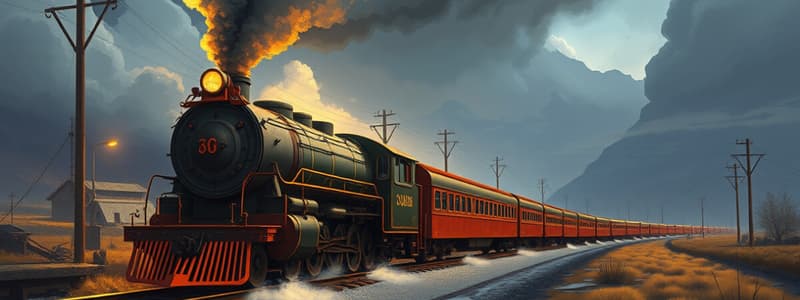Podcast
Questions and Answers
What is the purpose of the Interstate Commerce Act?
What is the purpose of the Interstate Commerce Act?
- To regulate the railroad industry (correct)
- To establish the Federal Reserve
- To promote free trade
- To eliminate monopolies in the oil industry
What is horizontal integration?
What is horizontal integration?
The process of a company increasing production at the same part of the supply chain.
What does vertical integration involve?
What does vertical integration involve?
The combination of two or more stages of production in one company.
Social Darwinism advocates that humans are subject to natural selection laws.
Social Darwinism advocates that humans are subject to natural selection laws.
The ___ Anti-Trust Act was passed in 1890.
The ___ Anti-Trust Act was passed in 1890.
Who founded the American Federation of Labor?
Who founded the American Federation of Labor?
What were the 'Wobblies'?
What were the 'Wobblies'?
What does the term 'scabs' refer to?
What does the term 'scabs' refer to?
What was the Bessemer process?
What was the Bessemer process?
What characterizes a political machine?
What characterizes a political machine?
What was the Haymarket Riot?
What was the Haymarket Riot?
What was the Pullman Strike?
What was the Pullman Strike?
Who was Ida Tarbell?
Who was Ida Tarbell?
What did the Homestead Strike involve?
What did the Homestead Strike involve?
What are settlement houses?
What are settlement houses?
What was the Sherman Silver Purchase Act?
What was the Sherman Silver Purchase Act?
What was the Social Gospel movement?
What was the Social Gospel movement?
Flashcards are hidden until you start studying
Study Notes
Interstate Commerce Act
- Established in 1887 to regulate the railroad industry and its monopolistic practices.
- Mandated reasonable and just railroad rates, without enabling the government to set specific prices.
- Required railroads to publicly disclose shipping rates and prohibited discriminatory pricing between short and long hauls.
- Created the Interstate Commerce Commission to monitor compliance with regulations.
Horizontal Integration
- Refers to a company's strategy to increase production of goods at the same supply chain stage.
- Achieved through internal growth, mergers, or acquisitions.
- Can lead to monopolistic control if a single company dominates the market.
Vertical Integration
- Involves the consolidation of multiple production stages within a single company that are typically managed by separate entities.
Social Darwinism
- A discredited theory positing that human societies and individuals are subject to natural selection similar to other species.
- Advocated by Herbert Spencer in the late 19th and early 20th centuries.
- Used to justify political conservatism, imperialism, and racism while opposing intervention and reform.
Sherman Anti-Trust Act
- Landmark federal statute passed in 1890 aimed at curbing monopolistic business practices.
- Allowed federal regulators to investigate and challenge trusts deemed anti-competitive.
American Federation of Labor (AFL)
- Founded in December 1886 in Columbus, Ohio, by craft unions separating from the Knights of Labor.
- Samuel Gompers served as the first president, leading until his death in 1924.
- Dominated U.S. labor movement for the first half of the 20th century and shifted to organizing on an industrial basis post-1935.
Industrial Workers of the World (IWW)
- Founded in 1905 in Chicago, known as "Wobblies."
- Combines general and industrial unionism, focusing on revolutionary industrial tactics.
- Associated with influential labor leader Eugene V. Debs, who was instrumental in the ARU and the Pullman Strike.
Scabs
- Derogatory term for strikebreakers who take over jobs during labor strikes.
Bessemer Process
- Inexpensive method for producing steel from molten pig iron.
- Key technique involved blowing air through molten iron to eliminate impurities and keep it molten.
Political Machines
- Political organizations led by a boss or small group that garners support through rewards.
- Notable figure: William "Boss" Tweed, who manipulated voter loyalty via patronage through Tammany Hall.
Haymarket Riot
- Resulted from a labor demonstration on May 4, 1886, in Chicago advocating for an eight-hour workday.
- Followed a bombing and subsequent violence, resulting in multiple deaths.
Pullman Strike
- Nationwide railroad strike occurring on May 11, 1894, involving the American Railway Union and the Pullman Company.
- Triggered by wage cuts and resulted in significant disruptions to transportation.
Ida Tarbell
- Influential journalist and muckraker, known for her investigative works, particularly against Standard Oil.
- Authored "The History of the Standard Oil Company," acclaimed for its impact on journalism.
Homestead Strike
- Major labor conflict beginning June 30, 1892, at the Homestead Steel Works in Pennsylvania.
- Involved violent clashes between strikers and private security, resulting in a setback for union efforts.
Settlement Houses
- Institutions in urban areas providing educational, recreational, and social services to local communities.
Sherman Silver Purchase Act
- Enacted on July 14, 1890, and aimed to increase government purchase of silver to support farmers and miners' interests.
- Required the government to buy 4.5 million ounces of silver monthly, addressing economic challenges like deflation.
Social Gospel Movement
- A religious movement connecting salvation with good works in the late 19th century.
- Advocated for helping the needy and critiqued Social Darwinism, influencing the Progressive Movement.
Studying That Suits You
Use AI to generate personalized quizzes and flashcards to suit your learning preferences.




